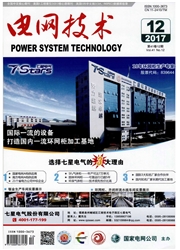

 中文摘要:
中文摘要:
按分解协调的思想,建立了考虑调峰、调频及环保约束的净收益最大化双层电源规划模型,计及了上网电价差异对电源规划的影响。上层规划为电源投资决策问题,以发电商总收益最大为目标函数,决策变量是待选电厂的投建时间和台数以及已有电厂的退役时间和台数;下层规划为生产优化决策问题,其又可以分成机组检修计划和随机生产模拟2个子问题,决策变量分别为发电机组的检修时段以及各发电机组在负荷曲线上的运行位置。提出了模拟植物生长算法、最小累积风险度法、等效电量频率法相结合的求解方法。算例结果验证了所建模型的合理性和有效性。
 英文摘要:
英文摘要:
The impacts of wind farms on system peak regulation, frequency regulation, and environmental protection are analyzed. To take above-mentioned impacts of wind farms into account and the impact of different generation price on investment decision, based on the idea of decomposition coordination, a bi-level generation expansion planning model for power grid containing large-scale wind farms is built. In this model the net earning maximization and the constraints of peak regulation, frequency regulation and environment protection are considered, in addition the influence of the differences among pool purchase prices on generation expansion planning is taken into account. The upper-level planning is a power source investment decision-making problem, so the total revenue maximization of gencos is taken as objective function and the decision variables are the construction time of the power plants to be build and the numbers of the generators to be installed in these plants, the retirement time of existing power plants and numbers of generators in these plants; the lower-level planning is a production optimization decision problem that can be divided into two subproblems, namely the maintenance scheduling and stochastic production simulation, and the decision variables are maintenance time intervals of generating units and the operating positions of generating units on load curve. To solve the proposed model, the plant growth simulation algorithm is integrated with minimum cumulative risk algorithm and equivalent energy and frequency function method is adopted. The feasibility and efficiency of the proposed model are verified by the results of numerical example.
 同期刊论文项目
同期刊论文项目
 同项目期刊论文
同项目期刊论文
 Evaluation of distributed generation connecting to distribution network based on long-run incrementa
Evaluation of distributed generation connecting to distribution network based on long-run incrementa 期刊信息
期刊信息
